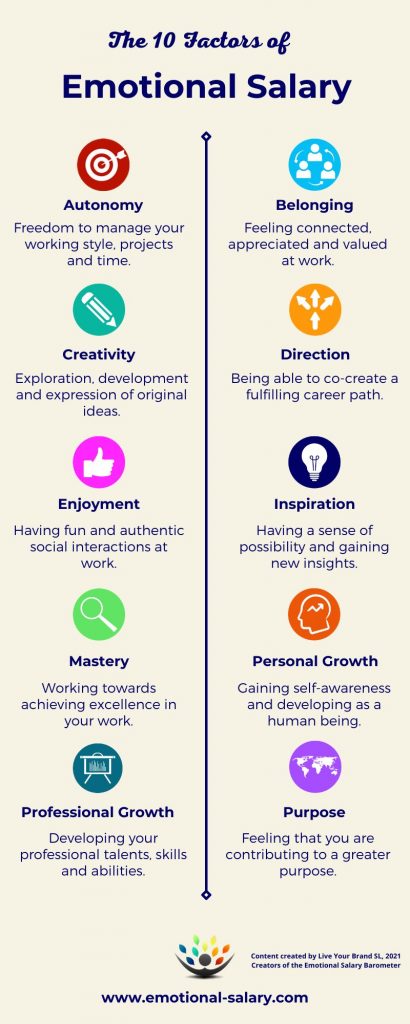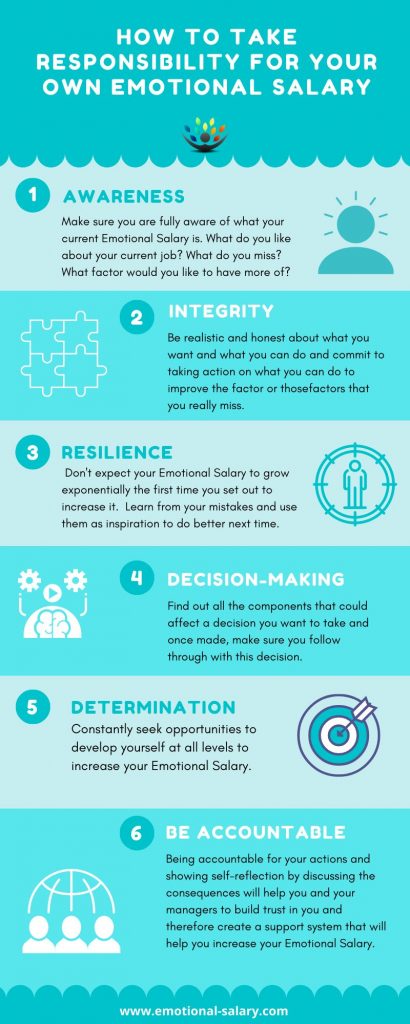Accept responsibility for your life. Know that it is you who will get you where you want to go, no one else. – Les Brown
Who’s responsible here?
When we talk about the Emotional Salary and who is responsible for it, we constantly emphasize that it is always a shared responsibility between individuals, leaders and the organisation. If any one of these essential elements is missing, the other two will struggle to increase Emotional Salary.
For example, imagine you are a leader who would like to increase your team’s Emotional Salary, but the company’s policies and culture do not support you. If this is the situation, it will be very difficult for you to succeed. Of course you will achieve something, but the momentum will be much greater if you together with the organisation and the people working on it are moving in the same direction.
Having said that, as an individual, if we want to increase our Emotional Salary, a key element for this to happen is to have the ability to take our own share of responsibility. Because, if we are honest, if we don’t know what we want or need, no one will. No one has a crystal ball to tell us what other people want or need to increase their emotional well-being at work. Below we explore 6 traits that we need to foster to start taking responsibility for increasing our Emotional Salary.
 1. Awareness
1. Awareness
Take the first step by making sure you are fully aware of what your current Emotional Salary is. What do you like about your current job? What do you miss? What factor would you like to have more of? Review the 10 factors that according to our research constitute Emotional Salary and describe in your own words how each of these factors shows up in your job. And, from there start to become aware of those factors that you are missing and would like to have more of, or those that you already have and want to continue to benefit from.
2. Integrity
Integrity is a skill and a trait that takes time to develop. Employees with integrity follow a strong moral code and can be trusted to make ethical decisions that benefit the company, those around them and themselves. So be realistic and honest about what you want and what you can do and commit to taking action on what you – and only you – can do to improve the factor or those factors that you really miss.
3. Resilience
Resilience refers to the willingness to keep going when faced with obstacles and the endurance to keep going after you have failed. Don’t expect your Emotional Salary to grow exponentially the first time you set out to increase it. Often, you will be faced with unexpected results that may feel like you’ve failed and make you want to stop trying to increase any factor of your Emotional Salary. Learn from your mistakes and use them as inspiration to do better next time. For example, imagine that you set out to improve a specific factor by having a conversation with your boss. And, in having this conversation, you have not had the results you expected. This should not discourage you from giving up. Map out what other actions you can take or conversations you can have in order to reach your goal.
4. Be accountable
Accept the consequences of your actions. Although responsibility and accountability are related, they are not the same. Being responsible for working on your tasks means taking action, while accountability is the result of that action. Knowing how to accept when you are on the right track and accepting when things do not go according to plan are both forms of accountability. Being accountable for your actions and showing self-reflection by discussing the consequences will help you and your managers to build trust in you and therefore create a support system that will help you increase your Emotional Salary.
5. Decision-making
Before making any decision that may have an effect on your Emotional Salary, find out all the components that affect this decision and once made, make sure you follow through with this decision. For example, let’s imagine that you want to have more autonomy in your job. Before you ask your boss, make sure that you have the knowledge, skills and discipline and that you are completely clear about the expected results.
6. Determination
Your determination and drive to succeed personally, socially and professionally are proof of your dedication to your well-being and growth. Constantly seek opportunities to develop yourself at all levels to increase your Emotional Salary. By doing this, without even realising it, you will begin to have an impact on everyone around you and thereby also have an impact on their Emotional Salary as well. Your strength and perseverance will have an effect on you and others, thus creating a virtuous circle in your workplace.

Conclusion
Too often we look to others to solve our problems, give us satisfaction or reassurance when we are stressed and anxious. If we constantly look to others to solve our problems and manage our mental health and wellbeing at work, we are likely to spend a lot of time frustrated, stressed and anxious and feel we are not making progress.
This does not mean that we should isolate ourselves from others or that positive relationships are not essential for happiness and wellbeing. It is simply a matter of putting control of our well-being at work in our own hands. Rather than being a victim of circumstance, we need to take the first step to move in the direction we want to go.
One thought on “How to take responsibility for your own Emotional Salary”
Comments are closed.